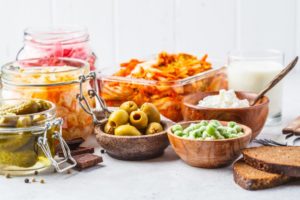Helpful Foods to Support Good Bacteria in Our Gut

Although bacteria and other microorganisms are responsible for causing some diseases, we now understand that not all microbes are bad. As a matter of fact, our gut alone is home to trillions of bacteria, fungi, viruses, and other microscopic creatures that actually help us digest food in a healthier way.
That said, finding the best foods that help support the good bacteria in your gut is not always easy. Some foods and medications may actually kill off these good microbes, so you have to be careful about what you ingest. Below, we’ll go over a few types of foods that have a positive effect in your intestinal flora.
The Benefits of Good Intestinal Flora
The term “intestinal flora” is used to describe a group of symbiotic bacteria that occur naturally in your gut. They work together in order to break down some of the foods you ingest and produce enzymes that allow your body to process nutrients in a more efficient way.
By eating foods that support good bacteria in your stomach, you can help reduce negative symptoms and address food phobias that can lower your life quality. Not only this, but they can potentially reduce signs of IBD, improve heart health, and enhance brain function.
Poor intestinal flora can have different effects on your body. These symptoms can range from an upset stomach to unexplained weight fluctuations, poor sleeping patterns, and sensitive skin. To avoid these, you should try to consume gut-healthy foods that help the good microorganisms in your body.
Below, you’ll find a list of foods that can help support good bacteria in your gut.
Probiotics Like Kombucha and Kefir
Even though they are technically not foods, probiotic drinks like kombucha and kefir can have a positive impact on the bacteria in your gut. These drinks rely on live cultures, so they introduce additional microorganisms that support your intestinal fauna. At the same time, you can also choose fermented drinks like a ginger bug or tepache, which offer the same benefits as probiotics.
Sauerkraut, Kimchi, and Other Fermented Foods
The process of fermentation is not limited to drinks. As a matter of fact, eating fermented foods once or twice a day can have a great effect on your gut bacteria. Sauerkraut is among the most popular choices because it goes well with a variety of cooking types, but you can also explore kimchi and other fermented options.
Unpasteurised Dairy Products
Dairy products are a natural source of live cultures, but the process of pasteurisation can kill all of the good microbes. Instead, you can opt for unpasteurised dairy products like cheese, yogurts, and milk to help build the good microorganisms in your body. Just remember to check the label or consult with your dairy products provider so they can point you to the right choices!
Sourdough Bread
With so many new cases of gluten intolerance and IBD, bread has earned a negative reputation in the last few years. But, sourdough bread, which consists of fermented dough, can also help the good bacteria in your gut. And, the process breaks down the gluten found in wheat, so it’s also a great choice for gluten intolerant people.
Brussel Sprouts and Selected Veggies
Vegetables like Brussel sprouts, garlic, and leeks can a huge amount of prebiotics, you can produce a positive effect on your intestinal flora. And, you can also ferment a wide variety of veggies and eat them once the process is complete.
Learn More About Our Self-Care Programs
The foods you consume have a direct impact on your overall well-being. The tips above should help you eat healthy foods that have a great effect on the good bacteria in your gut.
If you want to learn more about our self-care programs and how they can help you, contact us today and we’ll be glad to help.
Author Bio
Dr Alan Ong’s own personal experience with hair loss began when he was 19 years old. His research eventually led him to create Bioscor’s own special formulation to effectively fight hair loss. Since then, he and his daughter Dr Amanda Ong have continued Bioscor’s success and helped hair loss sufferers worldwide.
